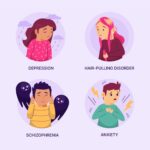The Effects of Depression on Your Body
Understanding the Basics of Depression
Depression is a common yet serious mood disorder. There’s more to it than just feeling down or experiencing a rough day.
Depression can affect anyone at any age. It impacts how we feel, think, and handle daily activities.
This article aims to provide an overview of depression. We’ll delve into its symptoms, effects, and treatment options.
We’ll also explore the unique challenges faced by children and teens with depression. Understanding these basics can help us support those affected.
Whether seeking information for personal knowledge or to help someone else, this guide is for you. Let’s demystify depression together.

What is Depression
Depression, also known as major depressive disorder, is a mental health condition. People experience persistent feelings of sadness and a lack of interest in activities.
Depression is not merely a case of feeling sad. It’s not a sign of weakness, nor is it something you can just “shake off”.
Depression affects people differently. Some people may experience a single episode, while others have recurrent bouts.
Here are some key features of depression:
- Persistent sadness, anxiety, or “empty” mood
- Feelings of hopelessness or pessimism
- Agitation
- Feelings of guilt, worthlessness, or helplessness
- Loss of interest or pleasure in hobbies and activities
- Decreased energy or fatigue
- Difficulty concentrating, remembering, or making decisions
- Insomnia or sleeping too much
- Appetite or weight changes
- Thoughts of death or suicide, or suicide attempts
- Aches or pains, headaches, cramps, or digestive problems without a clear physical cause and/or that do not ease even with treatment
Depression is a real and treatable medical condition. It can affect anyone, regardless of age or background. Understanding depression is the first step towards managing it effectively.
Depression treatment
Depression is a treatable condition. There are several options available, depending on the severity of the symptoms and individual needs.
Medication and psychotherapy are the most common treatments. Often, a combination of both is most effective.
In addition to these, lifestyle changes can also play a significant role in managing depression.
Let’s delve into these treatment options in more detail.

Depression including
- “Mental health awareness”
- “Signs of depression”
- “Depression in children”
- “Treatment for depression”
- “Coping with depression”
- “Depression support resources”
- “Understanding depression symptoms”
- “Impact of depression on daily life”
The Effects of Depression on Your Body
Depression doesn’t just affect your mind, it can also have physical effects on your body. One common symptom is feeling tired all the time.
This isn’t just regular tiredness. People with depression often feel a deep, pervasive fatigue that doesn’t improve with rest.
Depression can also cause trouble sleeping. Some people may struggle to fall asleep, while others may sleep too much.
Changes in appetite are another common symptom. Some people may lose their appetite and experience weight loss, while others may eat more and gain weight.
Finally, depression can also lead to physical aches and pains. This can include headaches, back pain, or stomach discomfort that doesn’t improve with treatment.
Depression Symptoms in Children and Teens
Depression in children and teens can manifest differently than in adults.
Noticing the signs early is important for getting help and support.
Here are some common signs to look out for:
- Persistent sadness or irritability
- Withdrawal from friends and family
- Loss of interest in previously enjoyed activities
- Changes in appetite or weight
- Difficulty concentrating or making decisions
- Sleep disturbances, such as insomnia or excessive sleeping
- Physical complaints, like headaches or stomachaches, without a clear cause
- Feelings of worthlessness or excessive guilt
- Thoughts of death or suicide
It’s important to note that children and teens may not always express their feelings verbally. Instead, they might show changes in behavior, academic performance, or social interactions. If you suspect a child or teen is struggling with depression, it’s essential to seek professional help. Early intervention can lead to better outcomes and help them navigate their challenges more effectively.

Recognizing the Symptoms of Depression
Medication and Side Effects
are often prescribed to treat depression. They work by balancing chemicals in your brain that affect mood and emotions.
However, these medications can have side effects. These may include nausea, weight gain, and trouble sleeping.
It’s important to discuss these potential side effects with your healthcare provider. They can help you weigh the benefits and risks.
The Emotional Challenges of Depression
Psychotherapy and Support
Psychotherapy, or talk therapy, is another effective treatment for depression. It involves discussing your condition and related issues with a mental health professional.
Psychotherapy can help you understand and manage your depression. It can also provide strategies to cope with stress and manage your mood.
Support from loved ones is also crucial. Their understanding and encouragement can make a significant difference in your recovery.
Mental health conditions
Mental health conditions affect how people think, feel, and act. They include common issues like anxiety and depression, as well as more serious disorders like schizophrenia.
Mental health is as important as physical health. It is essential to seek help when needed. Therapy, medication, and lifestyle changes can help manage symptoms.
Talking openly about mental health reduces stigma. This encourages more people to seek treatment. Remember, everyone’s experience is different, and it’s okay to ask for support. Taking care of your mental health is a key part of overall well-being.
The Connection Between Depression and Other Medical Conditions
Depression often coexists with other medical conditions. It’s not uncommon for people with chronic illnesses to also struggle with depression.
For instance, heart disease, diabetes, and cancer patients often experience depression. This can make managing their physical health more challenging.
Depression can also worsen the symptoms of these conditions. It can lead to poorer health outcomes and a lower quality of life.
Understanding this connection is crucial. It can help healthcare providers offer more comprehensive and effective treatment plans.
Treatment Options for Depression
Depression is a treatable condition. There are several options available, depending on the severity of the symptoms and individual needs.
Medication and psychotherapy are the most common treatments. Often, a combination of both is most effective.
In addition to these, lifestyle changes can also play a significant role in managing depression.
Let’s delve into these treatment options in more detail
The Importance of Support for People with Depression
Depression can often feel isolating. However, it’s important to remember that you’re not alone.
Support from family and friends can be a lifeline. Their understanding and patience can provide comfort and reduce feelings of loneliness.
Support groups can also be beneficial. Sharing experiences with others who are going through the same struggles can provide a sense of community and understanding.
Remember, seeking help is a sign of strength. Reach out to your loved ones or a mental health professional if you’re feeling overwhelmed.
Medication and Side Effects
Antidepressants are often prescribed to treat depression. They work by balancing chemicals in your brain that affect mood and emotions.
However, these medications can have side effects. These may include nausea, weight gain, and trouble sleeping.
It’s important to discuss these potential side effects with your healthcare provider. They can help you weigh the benefits and risks.

Psychotherapy and Support
Psychotherapy, or talk therapy, is another effective treatment for depression. It involves talking about your condition and related issues with a mental health professional.
Psychotherapy can help you understand and manage your depression. It can also provide strategies to cope with stress and manage your mood.
Support from loved ones is also crucial. Their understanding and encouragement can make a significant difference in your recovery.
Lifestyle Changes and Self-Care
Lifestyle changes can also help manage depression. Regular exercise, a healthy diet, and adequate sleep can improve your mood and energy levels.
Avoiding alcohol and recreational drugs is also important. These substances can worsen depression and might even make it harder for medication to work.
Self-care practices, such as relaxation and stress management techniques, can also help. These might include yoga, meditation, or deep-breathing exercises.
Conclusion: Taking the Next Steps
Understanding depression is the first step towards managing it. It’s crucial to seek help if you or someone you know is showing signs of depression.
Remember, it’s okay to ask for help. With the right support and treatment, it’s entirely possible to lead a fulfilling, happy life.
